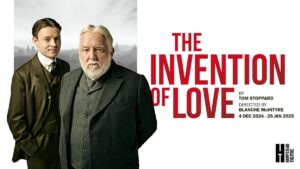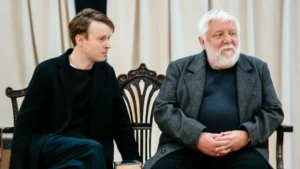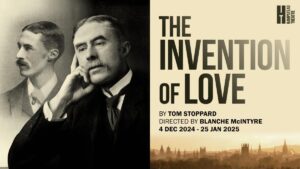Blanche McIntyre in conversation with Olivia Hurton
Director Blanche McIntyre has a spring in her step. When we meet at the Hampstead Theatre, she’s a whirlwind of excitement and energy—and that’s after a day of rehearsals for her forthcoming revival of Tom Stoppard’s The Invention of Love. McIntyre is much-acclaimed within British theatre, boasting an impressive body of work that, if studied closely, reveals what is so special about her—her unbounded passion for the great classics of theatre, which is counterbalanced by a sincere wish to extend this joy to others. The result is work that translates pieces that are intellectually or linguistically challenging, such as Shakespeare’s Titus Andronicus (RSC, 2017) or Stoppard’s Arcadia (Theatre Royal, Brighton, 2015), into a rapturous evening of stage delights, without ever compromising the pitch of thought. It’s an admirable feat; and if you can pull it off, you get described by Tom Stoppard as a ‘young, visionary director’.
McIntyre takes all this in her stride. Having parents who were both publishers, she grew up in a household where creativity was air and water. ‘Books, plays, music was a thing you just [did]’ she tells me; ‘you didn’t have to worry if you understood it or not […] but just go and see what you get out of it’. Her desire to challenge audiences whilst supporting them through her directorial role, one that she describes as being a ‘midwife’ delivering the ‘true nature’ of a play, has imperceptibly grown out of such early credos.

It was the ‘electric passion’ of Katie Mitchell’s 1994 production of Henry VI, Part III in Stratford that set McIntyre’s teenage heart ablaze. But her leanings, at least initially, were towards history, not directing—she didn’t know what the term meant. After unsatisfactory peregrinations as a Tudor historian, this headstrong fourteen-year-old concocted a plan to ‘recreate the fun’ another way. Soliciting a crew of school friends, she announced her intentions to stage a Medieval mystery play. ‘Obviously there was no money, so we took whatever we could find, whatever the school had spare that we could borrow.’ Flirting with performance, she cast herself in the lugubrious role of Death, but it was always directing that had a real lure. She explains that ‘being an actor, [means] you have to wait, which is intensely frustrating’; by contrast, the ‘joy of being a director is that you can say—as I did—I want to do [this play] […] People will go alright then, we’ll go and be part of it. And so, it’s much more easy to create things off your own bat’.

The Invention of Love at the Hampstead Theatre was not, however, McIntyre’s idea, but when she caught wind that it was being revived for the first time since its 1997 debut at the National’s Cottesloe Theatre, her steely determination was in full evidence. ‘I said I’d kick the door down and I pretty much did. I saw the script on his [the producer’s] desk and said, who’s directing this? I need to direct this!’ After seeing the original production at a time when she was consuming the classics fervently—Catullus, who features in the play, was coincidentally becoming a personal favourite—she recalls ‘[falling] in love with it sort of comprehensively […] I practically applied to St John’s [College, Oxford] because that’s where they all were’
Indeed, The Invention of Love is an Oxford play of sorts. Its keynotes are scholarship, poetry, epistemology, and first love. It follows the recently deceased A.E. Housman (who will be played by Simon Russell Beale), the preeminent Oxbridge classics scholar and Victorian poet of unrequited love, as he makes his way through the Stygian gloom of the underworld accompanied by Charon. Here youthful memories swirl back into being, and imaginary encounters are made possible. McIntyre’s affinity with the play is natural—she’s an Oxonian classicist. In fact, she eagerly directed the play as an undergraduate on the very ‘first […] day the rights became available’ and took it up to the Edinburgh Fringe. But as she rightly insists, the ‘point sort of isn’t Oxford’; the play has wider relatability. ‘Everybody knows what it is to be eighteen […] and feel the door to life opening and think I could do something here; I could really make a difference […] I could fall in love with a person and that be the great passion of my life.’

The great romantic passion of Housman’s life was Moses Jackson, an intimate college friend, whose temperament appears almost diametrically opposed to the poet’s own—Jackson was an overtly virile sportsman and scientist; Housman was a meticulous textual critic and natural romantic. Importantly, Jackson was completely incapable of reciprocating Housman’s desire; the result was lifelong heartbreak and ‘morbid secretions’ of poetry. How could an intensely rational man like Housman—or indeed, Oscar Wilde, another of the play’s intellectual greats—fall so blindly and illogically in love? McIntyre’s response is poignant: ‘[unrequited love] is a very painful state to be in and you can’t reason yourself out of it, as you say.’ Referring to the Sophocles quote that the older A.E. Housman cites elegiacally in the play, she continues, ‘Tom has a lovely explanation somewhere about the [line] ‘piece of ice held fast in the fist’ […] that you think of love as a thing that melts and is gone, but it’s not that. The thing about ice is it sticks to you. So, you hold it, and it hurts, and you try to get rid of it, and it hurts more.’
In fact, throughout the play, the beautiful, if irreparably fragmented, verse of ancient poets like Catullus, Horace, Sophocles, and Propertius, make up a personal vocabulary of heartbreak for Housman; through them he finds a coded way of expressing the love that dare not speak its name. Yet, these exquisite filaments of Latin and Greek, while plunging viewers into the play’s mythic world, present obvious challenges for actors and audiences. McIntyre tells me of her diligent cast ‘who have gone [and] worked out the Latin or the Greek word by word’; not content with that, these actor-scholars have referred to handbooks to achieve the authentic ‘Victorian pronunciation […] which Housman would have used.’ For audiences, the classical languages will be more exciting than alienating. As McIntyre points out, ‘anything important, Stoppard immediately translates so you’re never left hanging,’ enabling audiences to intimately share in the language of these half-serious, half-comical croquet-playing Oxford dons and ‘take on the scale of the thinking of the characters you’re meeting on stage’. It’s classic Stoppard— intellectual acrobatics, linguistic delight, and a gleeful sense of the serious absurdity of it all.

Stoppard is well-known for playing in paradoxes. Unsurprisingly, there is much joy when Oscar Wilde appears in The Invention of Love with his cutting one-liners and bravura inversions. When I mention him, McIntyre enthuses, ‘I think these two characters [Wilde and Housman] read very powerfully, especially to the LGBTQIA community.’ However, Wilde’s life of aesthetic indulgence and homosexual activism, which he was tragically made to suffer for, is often read by commentators as a contrast to Housman’s emotional repression and life of the mind. Of course—and rather ironically, given Housman’s abhorrence for sloppy scholarship—it’s far more complex than critics allow. McIntyre explains, ‘I would really like to resist that as an interpretation because I think that Housman, especially in the age [of the Labouchere Amendment that] we are talking about – his commitment to Jackson, his commitment to a monument to Jackson in the full knowledge that his love was unrequited, carries no sense of shame in it.’ Expanding on this, she says of Housman and Wilde, ‘We’re dealing [in the play] with two gigantic figures, both of whom have a powerful truth and an absolutely unmanageable love. As you say, they are much more alike than they think.’
The Invention of Love is, at its slowly thawing heart, a play preoccupied with monuments—a fragment of poetry as a monument, life mythologised as a work of art, monuments more lasting than bronze. But a theatrical performance, as McIntyre eloquently expresses, is something quite different: ‘The art form that I work in is one in which the art is written on water. And I know this, and there is no way to preserve what we make once the run finishes […] So, the temptation to feel a bit melancholy about the fact these artists are making something permanent and we are making something evanescent is very strong.’ She sees it the other way too, evincing an awareness that any art—a novel, a painting, a film—is experienced ‘in part of the river of your life; you can only experience it as a part of time passing.’ Smiling at me hopefully—as if disclosing a secret—she says: ‘The best I can hope for, a bit like Pater, is that the audience watch the play with a gem-like flame of awareness and come out having made a very intense set of memories and thinking about what’s been going on in the play and take the questions and ideas forward with them as they go.’ It is Sophocles’ ice in the hand again, the little filament of memory that continues to burn.
The Invention of Love runs at Hampstead Theatre until 1st February 2025.

